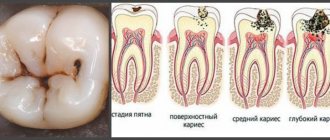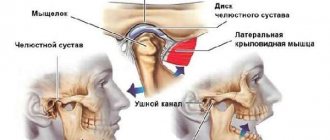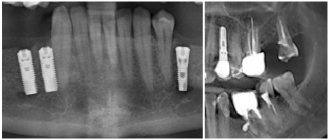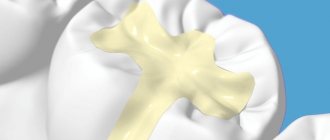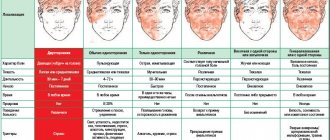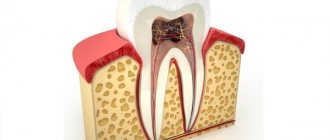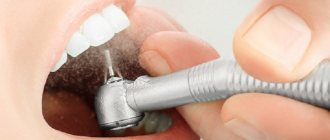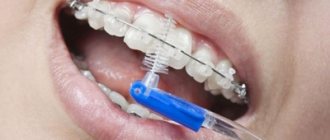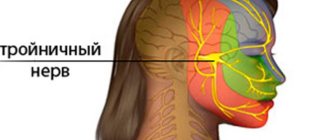Trismus - why the jaw cramps and how to get rid of the symptom
Trismus of the masticatory muscles is a spasm, a sharp contraction of the muscles and a strong closure of the jaws, when it is simply impossible to unclench them. The cause of the problem may be a negative impact on the trigeminal nerve during dental treatment, jaw injury, or, for example, problems with teeth and soft tissues of the oral cavity. Also, pathologies of internal organs and systems often lead to the development of symptoms. In this case, the person loses the ability to eat, talk and even breathe normally. Read further in this article about what trismus is, under what circumstances spasms of the facial muscles occur, and what treatment is indicated in this case.
How does the disease manifest itself?
Painful sensations in the jaw area are usually associated with dysfunction of the temporomandibular joint. It, like all other joints, has a capsule where quite complex muscle movements occur. And this is not surprising, because with its help many life processes occur, such as biting, chewing, yawning, communicating, coughing, laughing, etc.
According to many scientists, this joint is also responsible for balance in the body. So, if the jaw is in the correct position, then the remaining muscles of the face and head, in general, are not subject to heavy loads and do not experience discomfort. When the joint is shifted to one side, the center of gravity of the head changes, as a result of which not only the head, but also the neck begins to suffer. In addition, the cranial nerves may be pinched, causing the person to experience constant spasms.
Unpleasant sensations, such as cramping and pain in the jaw, can be present both day and night. Moreover, at night the pain can become even stronger. Much here depends on the psychological state of a person. Any stressful situation or lack of sleep can cause increased pain.
Trismus of the jaw - what is it?
So, trismus is a tonic spasm, a muscle spasm that is directly involved in the chewing process. Most often, this situation unfolds against the background of an irritating effect on the trigeminal nerve. Experts identify two main forms of the pathological condition:
- bilateral type - a common occurrence in which the lower jaw moves slightly back, tightly closing with the upper. The patient loses the ability to speak normally because he cannot open his mouth, and certain difficulties arise with eating. In some cases, a medicinal solution must be administered through intravenous injection to relieve symptoms. The pathological condition appears against the background of infectious and neuralgic pathologies,
- unilateral - becomes the result of inflammation or injury to the joints of the lower jaw. When the mouth opens, it shifts to the side, which results in pronounced facial asymmetry 1 . You can understand how it looks from the outside by looking at the photo below.
The photo shows the jaw with trismus.
The main distinguishing sign of trismus is excessive tension of the masticatory and temporal muscles. A symptom may indicate the presence of pathological processes in the body, so it is better to consult a doctor.
For what reasons can a spasm develop?
As already mentioned, the problem in question usually occurs when the trigeminal nerve is irritated or damaged. In this case, the cause of cramps can be either a dental disease or a systemic pathology of the body. Experts highlight a list of key factors that lead to a sharp reduction in the masticatory muscles:
- advanced stages of caries, pulpitis, inflammatory diseases of teeth and gums affecting periodontal tissues,
- jaw injuries,
- diseases of the ENT organs,
- brain pathologies, including tumors,
- trigeminal neurosis,
- inflamed periosteum (true for the lower jaw),
- a consequence of the administration of an anesthetic or a surgical operation, for example, after the removal of a wisdom tooth,
- arthrosis
Trauma may cause the problem
“This happened to me once when I was yawning. My jaw tightened, the pain was terrible. I could neither open nor close my mouth. All this lasted about half an hour. I read a relaxing massage technique on the Internet, and in my opinion, that was the only thing that saved me. If the cramp had lasted for at least a couple more minutes, I would have definitely run to the doctors.”
Anatoly K.B., Moscow, from correspondence on the forum www.32top.ru
Other reasons for the appearance of an unpleasant symptom include jaw injury due to an impact, as well as a sharp temperature change. Also, a similar condition is observed in the early stages of the development of such serious diseases as tetanus and rabies. Trismus is one of the characteristic symptoms of an epileptic attack.
Diagnostics
X-ray is the most accessible method for assessing the condition of the bones of the maxillofacial apparatus. In most cases, it is enough to detect a violation.
If no pathologies are found in the image, then they resort to ultrasound diagnostics (ultrasound), which shows the condition of soft tissues, blood vessels, nerve endings and other structures.
If a tumor is suspected, an MRI or CT scan is performed. These procedures display images layer by layer and in sections, so even very small tumors are detected. If the spasm does not occur very often, then there is no need for expensive research.
Additionally they rent out:
- general blood and urine analysis;
- rheumatoid factor;
- seromekuda protein;
- tumor markers.
It often happens that the cause of an unpleasant phenomenon cannot be determined.
Characteristic symptoms
At the moment of compression of the jaw, it is impossible to unclench on your own, since the temporomandibular joint is completely or partially immobilized. In the latter case, the person can only open his mouth slightly, which causes corresponding difficulties with speaking function. As a result, headaches appear and general health worsens. Such a problem may be dental, neuralgic or traumatic in nature.
With pathology, the jaw cannot be unclenched independently
Lower face
Trismus of the lower face is usually the result of injury. In such a situation, a person will experience pain when pressing on the causative area. External signs of damage may also appear in the form of abrasions, hematoma and swelling. This could be a fracture or, for example, a dislocation. But if the trigeminal nerve is damaged, the patient may experience attacks of acute pain of a short-term nature.
Simultaneous reduction of cheekbones and jaw
A similar phenomenon occurs against the background of joint dysfunction, arthritis, arthrosis, and vascular diseases. Spasms are the result of impaired blood supply and usually occur during chewing. If ear congestion is noted simultaneously with the symptom, the cause of the problem may lie in tonsillitis or disease of the ENT organs. If there is a malfunction of the heart and blood vessels, chills and a feeling of heaviness in the chest also appear. This condition is characteristic of a hypertensive crisis, which requires immediate medical attention. Characteristic symptoms such as numbness of the limbs and loss of sensation in the fingertips may appear.
Problems with yawning
A spasm can occur when yawning too intensely, in which case the cause of the problem is overstrain of the masticatory muscles. Trismus is preceded by hypertonicity, and the attack itself usually lasts no longer than half an hour. In some cases, it is necessary to resort to medical help to relieve the symptom, but the spasm, as a rule, goes away on its own.
Yawning may cause problems
Headache as a concomitant symptom
Trismus coupled with severe headache can be caused by neurosis due to hypertonicity of the masticatory muscles. Severe emotional stress can cause pain in the chin and numbness in the teeth. Often, patients in this situation complain of feeling as if their teeth are bothering them. Experts include overwork, migraines, spinal problems and a sedentary lifestyle as other possible causes of the pathological condition.
Treatment
The therapeutic regimen is prescribed individually based on the underlying disease and the patient’s well-being.
If the cause of pain and spasm is psychosomatic, it is recommended to take sedatives and antidepressants of natural or synthetic origin. Additionally, vitamin complexes, psychotherapy sessions, and physiotherapeutic procedures are prescribed. People who are prone to worry are advised to be less nervous, so as not to aggravate the problem, stop smoking and drinking alcohol, and also play sports.
If there is inflammation, then nonsteroidal anti-inflammatory drugs, glucocorticoids, and analgesics are prescribed.
If dental defects are detected, it is necessary to treat problematic teeth, gums and oral cavity. After filling, patients are prescribed antibiotic tablets and rinsing solutions.
Traditional methods are prescribed only with the permission of the attending physician.
Some purulent inflammations require surgical removal. Fractures are treated in a maxillofacial hospital. Metal or plastic structures are used to connect the fragments.
A muscle spasm that tightens the cheekbones and jaw is just a symptom of some pathology, so it is not advisable to begin treatment without an accurate diagnosis.
If the patient has a history of a fracture or other injury to the jaw on the left or right, then periodic muscle spasms are not surprising. If it appears infrequently, you should not pay too much attention to this problem. Constant reduction of the jaw bones is a bad sign, which indicates a possible pathology in the brain, central nervous system or internal organs. In this case, you should quickly contact a medical facility and undergo an examination.
What you can do on your own
In case of a hypertensive crisis, as well as in such dangerous pathological conditions as tetanus or rabies, the patient needs immediate medical attention. In other situations, if the spasm lasts too long or the attacks are repeated on a systematic basis, it is worth making an appointment with a doctor. To alleviate the condition, you can use the following recommendations:
- a painkiller tablet will help relieve pain,
- a warm compress will relax the muscles - to do this, just take a small container with warm liquid and bring it to the sore spot. This will stimulate blood circulation and eliminate spasm,
- a cold compress will help relieve inflammation - about 5-10 minutes after the warm compress, the sore spot should be cooled. This will reduce inflammation and pain,
A compress will help relieve spasms
- Massaging the chewing muscles will help stretch the muscles and relax them a little - to do this, feel the soft area on the cheeks with your fingertips, closer to the lower jaw. You need to massage with light movements for half an hour,
- try not to think about the bad and just relax - stress is one of the key factors of the problem.
If the attack lasts a long time and causes severe pain, be sure to go to the doctor. In some cases, self-medication can lead to even more serious complications.
How to treat a symptom
We have figured out how to relieve spasms at home, and now it’s time to talk about treatment, which largely depends on the degree of manifestation of the symptom and the cause that caused it. First you need to eliminate the root of the problem. If the whole problem is neuralgia, sedatives are prescribed without fail, which have a calming effect. With the development of inflammatory processes, it is necessary to eliminate the consequences of damage or a source of infection, for which antibiotics are usually prescribed. In case of injury, the jaw is immobilized, and physiotherapeutic recovery methods are also used - it is recommended to do special gymnastics.
Gymnastics is performed for treatment
Treatment of trismus usually involves artificial administration of fluids and nutrition, since the patient in this condition urgently needs an abundant supply of nutrients. In particularly serious cases, the patient may be placed under inpatient observation.
Preventive measures and prognosis
For the purpose of prevention, experts recommend a careful approach to the health of the oral cavity and the body as a whole. Since one of the reasons for the manifestation of this unpleasant symptom is dental diseases, to prevent their development it is necessary to provide competent and systematic oral care. Remember to regularly brush your teeth, rinse your mouth after eating, floss, and visit the dentist at least twice a year. Try to eliminate factors and circumstances that could lead to overstrain of the facial muscles, and if the first suspicious symptoms appear, immediately consult a doctor.
Regular brushing of teeth and tongue will help avoid problems.
If the cause of all troubles lies in a dental disease, inflammation of the ENT organs, or is of a neuralgic nature, then after eliminating the original source of the problem, the symptom will disappear by itself. When trismus results from injury, the patient's condition is normalized through various exercises aimed at restoring the muscles. In many ways, the prognosis will depend on how advanced the causative pathology is.
- Grinin V.M., Adilkhanyan V.A. Clinical and radiological assessment of the pathology of the temporomandibular joint in rheumatic diseases, 2009.
Add a comment Cancel reply
This site uses Akismet to reduce spam. Find out how your comment data is processed.
Have you experienced that your jaw is cramping? This means that muscle spasm is to blame - an extremely unpleasant phenomenon, especially if it is accompanied by pain or haunts you on an ongoing basis, and is not an isolated case. The editors of the UltraSmile.ru portal want readers to be extremely attentive to the state of their health and pay close attention to the physical manifestations of the body, which may be direct evidence of its internal problems. If you encounter such a problem, this is a reason to visit a specialist, and not resort to self-medication and wonder what happened.
What causes jaw cramps?
Read our detailed material in which you will find out why your jaw cramps and what it may be connected with.
Cheekbone spasm from nerves
The nervous system instantly reacts to any problems in the body. Spasms in the cheekbone area are no exception. Psychosomatics explains this phenomenon as follows: nerve lesions may be absent, but muscles that are in constant tension lead to the fact that the cheekbones begin to cramp. So cheekbone spasms occur due to a disorder of the nervous system, which is often caused by external factors beyond our control: the impact of stressful situations on the body, increased emotionality. All this negatively affects our state of mind, and, accordingly, our health.
What to do when your cheekbones and jaw cramp in your sleep? Those who have had to go through such unpleasant sensations are wondering. Indeed, in this case, spasms appear precisely during sleep. Compresses are powerless here, but taking a sedative won’t hurt.
Advice! Distraction and relaxation is what is needed now. And also do not forget about a light massage of areas of the face that shrink from cramps.
But if the spasm even disappears, you should not postpone going to the doctor. You should contact a neurologist. Neuralgia, psychological diseases, and inflammation of the nerves may occur here.
Reason 3: neurological problems
Muscle cramps can quite easily be explained by psychosomatics, especially if you have been in a state of tension or fatigue for a long time, experienced stress, severe anger or fear, or were physically and mentally exhausted. The presence of mental disorders or inflammation of the ternary nerve (in particular applicable to the lower jaw) can also explain why the jaw cramps.
Stress can lead to facial muscle cramps
In this case, treatment should be prescribed by a psychotherapist or neurologist. It is possible that you will have to focus on taking sedatives, and it is also important to ensure peace of mind, get more rest, and get rid of disorders in any of their manifestations (unfavorable environment at work and at home)
Reason 4: injuries to the jaw system
Fractures and dislocations due to accidents, falls or other circumstances (for example, playing dangerous sports) are unlikely to go unnoticed by you. Such injuries will be accompanied by severe pain, swelling, the formation of hematomas and bruises.
Even a small dislocation of a joint, injury to the spine or jaw can lead to unpleasant consequences: when you yawn, you will feel a cramp under your chin, spasms will naturally begin to bother you during and after eating (unpleasant muscle contractions will be especially noticeable when chewing solid food), and everything In addition, frequent migraine attacks will also occur.
Jaw injury may cause problems
During treatment and rehabilitation from injuries, pay attention to your diet and try to minimize the consumption of hard foods, as they cause incredible muscle tension when chewing.
With frequent muscle spasms for no apparent reason, it is important to exclude oncological diseases localized in the area of the maxillofacial apparatus and head. You should also pay attention to examining the esophagus in case you are worried about muscle spasms when eating sour or salty foods, or difficulties in swallowing food.
The nature of pain and its nature
There are many reasons for unpleasant sensations. People often confuse pain and spasm. A cramp occurs against the background of muscle contraction, which develops in response to irritation or inflammation of the nerve roots.
Painful sensations are provoked by an inflamed maxillofacial joint or impact on the nerve roots.
A bilateral pathological process often develops. The attack can be acute or aching. It all depends on the reason that provoked the violation. Dull nagging pain occurs with a bruise, after fusion of bones or their reduction into place. Often, the unpleasant symptom intensifies in the evening, before sleep or late at night.
It is impossible to find out on your own why your jaw is cramping. If the spasm was preceded by an injury, you should at least take an x-ray.
Reason 6: overload at work
This point especially applies to those who spend a lot of time at the computer in a sitting position, and during the working day do not at all strive to leave the room for a minute and go out into the fresh air. Also, the reason why your jaw is cramped and you can’t even open your mouth is often due to the abuse of telephone conversations, when the phone is literally pressed to your ear, your neck is bent. Here the blood circulation is disrupted and the jaw begins to cramp.
The jaw can cramp from stress and a sedentary lifestyle.
Has your jaw cramped under the above circumstances? The first thing you need to do is: relax and take a short break for yourself, wherever you are, massage your temples, ears and neck, go outside or open a window, walk a little, try to relax, relieving nervous tension and fatigue.
With a headache
A condition in which the cheekbones cramp and a headache occurs at the same time usually occurs for completely everyday reasons:
- overwork, insomnia;
- passive lifestyle, lack of walks in the fresh air;
- sedentary work, especially at the computer;
- residual effects of injuries (jaw, head or spine);
- in people suffering from migraines.
Doctors note that headaches and jaw cramps most often occur during neuroses or mental disorders. With nervous overstrain, teeth may go numb or there may be an unpleasant feeling that they are in the way.
Sometimes a condition in which the cheekbones are cramped can be aggravated by the following symptoms:
- stuffy ears;
- ringing and buzzing in the head;
- pain radiates to the ear;
- tinnitus (noise and ringing in the ears).
The main reasons for a cramped jaw and stuffy ears:
- pathologies of the larynx, tympanic cavity, tonsillitis;
- tumors in the brain or ear area;
- consequences of severe trauma;
- nervous disorders;
- against the background of age-related changes.
Clinical symptoms require serious consideration, so at the first sign it is better to immediately make an appointment with an otolaryngologist.
Why does my jaw cramp?
Women may experience single or multiple symptoms of jaw spasms during pregnancy; they can be short-term or long-lasting. They occur in the following cases:
- when yawning;
- if you suffer from bruxism (grinding your teeth in your sleep);
- for nervous tension;
- for osteochondrosis and other lesions of the cervical spine;
- with muscle strain;
- for some dental problems.
The reasons for the appearance of unpleasant sensations on the right or left side of the jaw in a child or an adult may be associated with injury. What causes jaw cramps and how to cope with this condition – a specialist will tell you.
Lower jaw only
If you have cramping in your lower jaw, this may indicate damage to the trigeminal nerve, which is responsible for innervation of the face. Therefore, such pains radiate to the teeth and one half of the face; they differ in average duration from 10 to 20 minutes.
It is necessary to exclude oncological diseases of the head, muscles, nasopharynx and oral cavity. If you suspect oncology, contact your surgeon, he will adjust your examination and prescribe treatment.
Jaw and cheekbones
The jaw may also become cramped due to the following diseases:
Jaw muscle spasm when yawning
Convulsive muscle contractions during yawning or at the end of the process occur frequently. A dentist, neurologist or surgeon will help you find out the cause of the disease. There may have been an injury, but now only a spasm when yawning or the appearance of slight swelling reminds of this. In this case, cooling compresses can help.
Try changing your diet and switching to soft foods, because chewing hard foods causes severe muscle tension. When you yawn, some muscles lose their tone, and then become hypertonic at the end if they were tense before.
Jaw cramps and headache
There are many reasons for the appearance of pain in the temples or throughout the head when there is a contracted jaw. It could be:
- fatigue;
- long sedentary work;
- migraine;
- nervous tension;
- consequences of injuries to the spine and jaw;
- working on a computer;
- lack of fresh air.
Tightens jaw and stuffy ears
With such symptoms, consultation with an otolaryngologist is necessary. The cause may range from tonsillitis and damage to the larynx, to tumors in this area. Neuralgia can also provoke spasm and congestion in the ears.
Get rid of the habit of propping your head up and talking on the phone, holding it between your ear and neck. Massage under the ear and apply heat to relax the muscles.
Bruxism
It is easy to identify this disease: if your jaw is clenched tightly in a dream, there is grinding of your teeth. As a result, after waking up, a person experiences severe pain in the jaw and head. Teeth lose part of their enamel, crowns wear off, the position of the teeth is unstable, they become loose.
It is impossible to notice bruxism on your own, but if someone from the outside hears teeth grinding in a dream, then its presence will be obvious.
Jaw spasm from nerves
The nervous system always reacts to any changes in our body, and this can manifest itself as discomfort in the jaw and spasms. Psychosomatics explains the presence of such symptoms by the fact that there may be no nerve damage, but muscles that are under constant tension result in spasm.
If there is no tone, we panic because of numbness and weakness in a certain place. With nervous tension, the jaw may clench in sleep. Then it is necessary to take mild sedatives and consult a neurologist. Nervous stress does not go away without leaving a trace if you experience the following symptoms, such as cramps or muscle pain:
Try to distract yourself and relax by massaging your jaw yourself. Cramps in the jaw may indicate neuralgia, inflammation of the nerves, or the presence of mental illness.
While eating while chewing
Spasms can occur with minor damage or trauma to the joint. It can occur when chewing hard food.
If you have had a joint dislocation, even a minor one, then muscle tension while eating leads to involuntary muscle contraction.
After food (sour) or drinks (alcohol)
Some foods can cause esophageal spasm, which will lead to jaw spasm.
If you have difficulty swallowing or problems with salivation, muscle spasms may also occur. Contact a gastroenterologist or neurologist depending on the etiology of the disease.
Dental diseases
Ordinary caries or complicated pulpitis cause destruction not only in the bone tissue of the tooth, but also in the gums. The resulting swelling compresses the nerve fibers, which provokes spasm and pain. Convulsions may occur with:
Types of jaw pain and spasms
The type of pain manifests itself depending on the provoking factor.
Acute pain syndrome is often accompanied by:
- serious injuries (dislocations, bruises, fractures);
- acute inflammation;
- bone infection;
- exacerbation of rheumatoid arthritis, etc.
Against the backdrop of strong physical impact, the ears often become blocked, nausea and headaches may occur.
Dull pain is more typical for chronic diseases that last in the body for a long time. They are caused by dental pathologies, infectious processes in the oral cavity and other factors. Other symptoms are usually mild or absent.
Muscle spasms tighten the cheekbones and jaw. This is manifested by a sharp compressive pain of varying intensity, which gradually subsides.
Most often, seizures are provoked by:
- psychosomatic factors;
- GM diseases;
- diseases of the gastrointestinal tract in which the absorption of nutrients, especially B vitamins, is impaired.
The problem is aggravated if hard food gets into the oral cavity.
What to do if your jaw cramps?
Pay attention to when and in what place you experience cramps and what causes them. A visit to the doctor is necessary if:
- spasms in one part, there is a rise in temperature,
- swelling;
- severe pain;
- cramps in the lower part of the face and pain radiates to the eye;
- constant, lingering pain;
- throbbing pain with spasm.
Video: how to relax your jaw muscles?
Post Views: 60
Pain due to injury
Everyone knows that surgical interventions in the jaw area, various injuries and damage to the face and neck do not pass without leaving a trace. A severe blow to the face can result in a jaw fracture. In addition, the jaw joint may be damaged, causing the jaws to be in an incorrect position and lose mobility, and an attempt to close them will be accompanied by acute pain in the joint area. If pain is associated with injury, swelling often appears at the site of injury.
